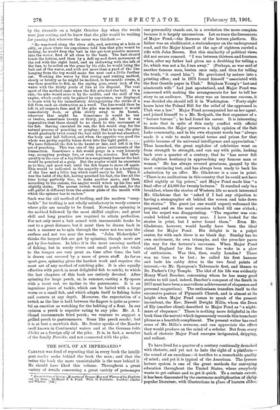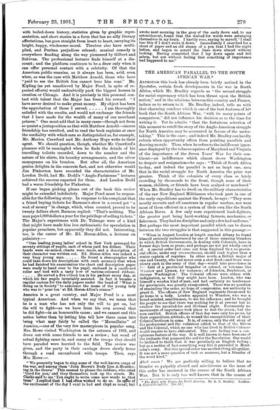THE SOUL OF AN IMPRESARIO.*
CARLYLE was fond of repeating that in every book the intelli- gent reader seeks behind the book the man ; and that the better the book the more unmistakable is the man behind it. He should have liked this volume. Throughout a great variety of details concerning a great variety of personages • Eccsnersedies of Goniu.s : 4E0)u:wigs di-Farnatid Merg and Woman (VW riatfarat and the Stodo. By blijor J. B. Pond. With 91 Portraits. Londchf: Chahto and WIndus. [1ft.) one personality stands out, in a revelation the more complete because it is largely unconscious. Let us trace the lineaments of Major Pond,—the Barnum of the lecture platform. His father was an abolitionist, a stationkeeper on the underground road, and the Major himself at the age of eighteen carried a rifle with John Brown. But this similarity of political views did not secure concord. "I was between thirteen and fourteen when, after my father had given me a drubbing for telling a lie, which was not a lie, I ran away." (Perhaps, as was said of another famous man, beaten once only, and then for telling the truth, "it cured him.") He gravitated by nature into a printing office; and in 1873 found himself "associated with the first Gentile paper in Utah." Brigham Young's" last and nineteenth wife" had just apostatised, and Major Pond was concerned with making the arrangements for her to tell her story to an audience. The story was an immense success, it was decided she should tell it in Washington. "Forty-eight hours later the Poland Bill for the relief of the oppressed in Utah was a law." Major Pond accompanied her as her agent, and joined himself to a Mr. Redpath, the first organiser of a "lecture bureau " ; he had found his career. It is interesting to note that in spite of this early conflict with official Mormonism, the Major preserves a high opinion of the Salt Lake community, and in his own eloquent words has "always made it a rule to make special terms and prices for that public because of its universal intelligence and appreciation." Thus launched, the great exploiter of celebrities went on from strength to strength, and can say with pride, looking back over a quarter of a century, that he "has never felt the slightest hesitancy in approaching any famous man or woman." He has always revered greatness, gauged by the most convincing test, and has always been ready to back his admiration by an offer. Mr. Gladstone is a case in point. "There is no auditorium in this country that he could not have filled nightly at big prices," and Major Pond made him "a final offer of £4,000 for twenty lectures." It resulted only in a breakfast, where the stories of Western life so much interested Mr. Gladstone that he "asked if I had any objection to having a stenographer sit behind the screen and take down the stories." The guest (as one would expect) welcomed the proposal, and on the next occasion talked till one o'clock ; but the sequel was disappointing. "The reporter was con- cealed behind a screen very near. I have looked for the stories in print, but I never found them." Even Mr. Gladstone, however, would hardly have been the ideal client for Major Pond. His delight is in a pulpit orator, for with such there is no blank day. Sunday has its own excitement, its own triumphs, and the preacher paves the way for the lecturer's successes. When Major Pond visited England for the first time he woke in a glow of enthusiasm. Was this, then, really London? There was no time to be lost ; he called his first hansom and bade his cabby drive to the two focal points of interest,—to Mr. Spurgeon's Tabernacle first, and thence to Dr. Parker's City Temple. The idol of his life was evidently Henry Ward Beecher, concerning whom he has many good stories to tell (and, indeed, Beecher's conquest of the South in 1877 must have been a marvellous achievement of eloquence and personal magnetism). The enthusiasm transfers itself to the successive pastors of Plymouth Church, and is almost at its height when Major Pond comes to speak of the present incumbent, the Rev. Newell Dwight -Hillis, whom the Dean of Ely (another client) described to Major Pond as "a night- mare of eloquence." There is nothing more delightful in the book than the naivete which ingenuously records this trenchant phrase as a heartfelt compliment. The present writer has read some of Mr. Hillis's sermons, and can appreciate the effect they would produce on the mind of a scholar. But from every bath of rhetoric Major Pond emerges invigorated, dripping, and radiant.
To have lived for a quarter of a century continually drenched with rhetoric, and yet not to hate the sight of a platform— the sound of an exordium—it testifies to a remarkable quality of mind ; and yet it is typical of the American. The lyceum lecture system is one of the great methods for conveying education throughout the United States, where everybody wants to get culture and to get it quick. To a certain extent, it has been discounted by the enormous multiplication. -of -eltrAS popular literature, with illustrations in place Lantern slides,:
with boiled-down history, statistics given by graphic repre- sentation, and short stories in a form that has no silly literary affectations, but goes straight from heart to heart, carrying its bright, happy, wholesome moral. Theatres also have multi- plied, and Puritan prejudices relaxed; musical comedy is everywhere flooding along the way pioneered by Gilbert and Sullivan. The professional lecturer finds himself at a dis- oount ; and the platform continues to be a draw only when it can offer personal contact with a celebrity. Of that the American public remains, as it always has been, avid, even when, as was the case with Matthew Arnold, those who have "paid to see the British lion cannot hear him roar." Mr. Kipling (as yet unachieved by Major Pond, in spite of re- peated efforts) would undoubtedly pack the biggest houses in creation or Chicago. And it is precisely in this personal con- tact with talent that the Major has found his reward. "1 have never desired to make great money. My object has been the approbation of those I served. I am thoroughly satisfied with the results, and would not exchange the friends that I have made for the wealth of many of our merchant princes." One must add that in many cases—though not from so quaint a juxtaposition as that with Matthew Arnold—sincere friendship has resulted, and to read the book explains at once the cordiality with which men so distinguished as, for example, Mr: 'Marion Crawford and Mr; Anthony Hope write to their agent. We should question, though, whether Mr. Orawfcird's pleasure will be unmingled when he finds the details of his travelling toilette recorded, down to the number and the nature of his shirts, his laundry arrangements, and the silver monograms on his brushes. But after all, the American genius delights in the concrete fact, and not otherwise would Jim Pinkerton have recorded the characteristics of Mr. Loudon Dodd, had Mr. Dodd's " Anglo-Parisienne " lectures achieved the success expected for them. And Loudon Dodd had a warm friendship for Pinkerton.
If one began picking plums out of the book this review might be extended indefinitely. Major Pond must be respon- sible for the following story. In response to his complaint that a friend buying tickets for Barnum's show in a crowd got " a wad of money" in change, which, when counted, proved to be twenty dollars short, Barnum replied: "That's nothing. The man pays 5,000 dollars a year for the privilege of selling tickets." The Major's experiences with Dr. Talmage were of a kind that might have made him less enthusiastic for speculation in _ _
popular preachers, but apparently they did not. Interesting, too, is the career of Mr. Ed. Heron-Allen, a . lecturer on palmistry:— One leading young ladies' school in New York arranged for seventy sittings of pupils, each of whom paid ten dollars. Their hands were examined, charts were made, and a description of their character was written out. Ed. Heron-Allen was indeed a
very busy young man He found a stenographer who could take down his descriptions with such accuracy that when he had finished his examination the chart and description paper were ready to hand over to the pupil, enclosed in a cardboard roller and tied with a, tasty bow of various-coloured ribbons.
. . . . He served a five o'clock tea in his parlour every day, at
which his fair pupils invariably assisted. In fact it became a rainier custom for the daily papers under the head of 'What is Going on in Society to announce the name of the young lady who was to pour tea' at Ed..Heron-Allen's seance."
America is a great country, and Major Pond is a most typical American. And when we say that, we mean that he is a man who has not only the will to get on, but the will to fight—as we have from his own avowal that he did fight—in an honourable cause ; and we csamot end this notice better than by letting him tell how there came into being what may fairly be called the " Marseillaise " of America,—one of the very few masterpieces in popular song. Mrs. Howe visited Washington in the autumn of 1861, and drove out with some friends to see a review ; but word of
actual fighting came in, and many of the troops that should have paraded were hurried to the field. The review was given, and the party in their carriage drove slowly home through a road encumbered with troops. Then, says Mrs. Howe :— " We presently began to sing some of the well-known songs of the war, and among them 'John Brown's Body Lies A-Moulder- ing in the Grave.' This seemed to please the soldiers, who cried G_eod for you,' and they themselves took up the strain. Mr. Clarke said lo me 'You ought to write some new words to that tuns.' I replied that I had often wished to do so. In spfte of the excitement of the day I Went to bed and slept as usual, tont awoke next morning in the grey of the early dawn and, to my astonishment, found that the wished for words were arranging themselves in my brain. I hastily rose, saying to myself, I shall lose this if I don't write it down.' Immediately I searched for a sheet of paper and an old stump of a pen that I had the night before, and began to scrawl the lines down almost without looking. Having completed that I lay down again and fell asleep, but not without feeling that something of importance had happened to me."







































 Previous page
Previous page